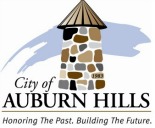
Media contacts: Barbara Fornasiero, EAFocus Communications; 248.651.7536 cell: 586.817.8414; barbara@eafocus.com; Stephanie Carroll, City of Auburn Hills; 248.364.6802; scarroll@auburnhills.org
Auburn Hills, MI—July 11, 2013—The city of Auburn Hills is believed to be the first Michigan community to adopt a resolution supporting alternative fuel vehicles among its municipal fleet following the city council’s acceptance of the findings in the Fuel Forward Fleet Study conducted by the Ann Arbor-based Clean Energy Coalition (CEC).
The CEC’s analysis determined where alternative fuel vehicles can be utilized to retrofit the city’s fleet of vehicles in order to experience long-term cost savings and reduced emissions. Identified areas for improvement included idle reduction of the city’s police fleet, compressed natural gas for city pickup trucks, liquefied propane gas for city police vehicles, alternatively fueled lawn equipment and support of the advancement of alternative fuel vehicles and alternative fueling infrastructure.
“The report from the CEC helped guide the city’s decision on planning for a cleaner, more fuel-efficient fleet while being mindful of our continued focus on economic development and supporting the automotive manufacturing industry,” said Steve Cohen, director of community development for the city of Auburn Hills.
According to Cohen, the city council’s adoption of the Fuel Forward Fleet Study makes a strong statement that Auburn Hills is willing to stand as a leader in fiscal responsibility, environmental stewardship and energy independence.
“The city council has set forth numerous strategic goals such as fiscal sustainability through operational efficiencies, delivering outstanding city services, investigating and pursuing emerging technology regarding infrastructure rehabilitation and focusing on being Michigan’s model ‘plug-in electric vehicle ready community’,” said Cohen. “Adopting the recommendations from the CEC allows us to adhere to and surpass the city’s goals.”
In addition to adopting a resolution supporting alternative fuel vehicles, the city council approved the following purchases:
• Eight propane auto gas units, plus corresponding installation and training, for the new 2013 Dodge Charger police pursuit vehicles in the amount of $32,860.00
• A fuel dispenser in the amount of $15,700.00 and the purchase of propane fuel for one year at a price of $1.69(9) per gallon (minimum 10,000 gallons)
• One 2014 combination jet and vacuum truck in the amount of $252,446.24
“Incorporating eight new propane bi-fuel police pursuit vehicles into the Department of Emergency Services’ fleet is expected to save the city about $44,000 in fuel and maintenance cost combined over the 4.72 year average life cycle of the vehicles”, said Department of Public Works (DPW) Director, Ron Melchert.
According to Melchert, the ROI could be as soon as 2.5 years, when considering the cost of the eight propane auto gas units, training and the LPG fueling dispenser compared to the anticipated fuel and maintenance savings. Other benefits include a reduction of dependence on foreign oil, a 13% reduction in greenhouse gas emissions and the support of a US produced propane energy source.
The 2014 combination jet and vacuum truck is a traditional diesel powered piece of equipment used for sanitary and storm sewer maintenance. Research is currently underway to incorporate compressed natural gas (CNG) powered equipment into the DPW fleet, which proposes some significant costs savings similar to propane. However, Melchert noted the CNG dispensing station costs more than $1 million to construct and a viable ROI cannot be realized at this time.
“The availability of fueling station infrastructure is key to the success of moving alternative fuel vehicles forward in the market place,” said Melchert.
Mark Rabinsky, project manager for the Clean Energy Coalition, commended Auburn Hills for its continued efforts in advancing a green approach in municipal operations.
“The city of Auburn Hills has shown time and again they are a leader in Michigan. No other city in the state has been more active in promoting the use of electric vehicles and now, by supporting the advancement of other forms of alternative fuels, the city is paving the way for other municipalities to do the same,” said Rabinsky.
To read the CEC’s Fuel Forward Fleet Study in its entirety, visit http://71.6.170.26/revize/auburnhills/document_center/AH_Fuel_Forward_Report.pdf.
The alternative fuels adoption coincides with Auburn Hills’ new designation as a partner in the Workplace Charging Challenge, a collaboration between the Department of Energy (DOE) and American innovators to accelerate the development and commercialization of the next generation of plug-in electric vehicles (PEVs) and charging infrastructure. The challenge is intended to transform the way employers view their role in building the country’s PEV charging infrastructure. Auburn Hills was invited by the DOE to be a partner in the prestigious program based on its leadership in promoting PEV readiness both statewide and nationally.
About Auburn Hills
Celebrating 30 years in 2013 as a city committed to innovation and growth, Auburn Hills is home to more than 21,000 residents and also serves as Michigan’s global business address, with 40 international corporations from 32 countries housed here, including Chrysler Group LLC and Borg Warner headquarters. Auburn Hills’ residents enjoy the amenities of city and suburban living with parks, a revitalized downtown district and a welcoming city complex with a library and community center. Additionally, the city has five colleges and universities, the award winning Palace of Auburn Hills entertainment complex and Great Lakes Crossing Outlets, one of the state’s largest destination shopping centers, providing a variety of cultural, social and educational opportunities to residents, workers and visitors. Learn more at www.auburnhills.org.


